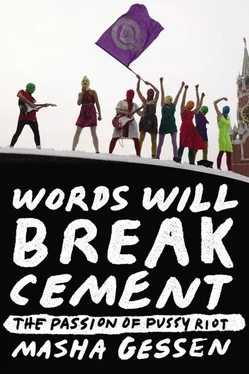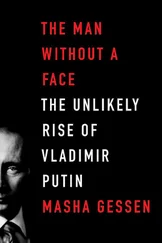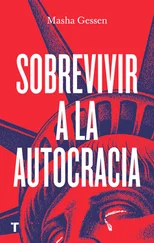Assorted fruit
Bedding
Inmates are allowed only plain white bedding; last time, a pillowcase was turned away because it exhibited piping, which is apparently not allowed, despite also being white. The opposite rule applies to underwear: it must be plain black. Petya dropped an empty Uniqlo thermal-underwear package to the floor.
Books:
My Testimony by Anatoly Marchenko
Marchenko was a Soviet dissident who spent years writing this exhaustive accounting of the lives of political inmates in Soviet camps; he died behind bars in 1986, following a hunger strike to demand the release of political prisoners. Nadya had asked for this book specifically; Petya had been unable to find a copy for sale, so we brought the one from my personal library. Two human rights activists who had been helping Petya had added another eight books by and about dissidents. A Russian translation of a book by the philosopher Slavoj Žižek rounded out the list of ten—the maximum number of books allowed at one time. Nadya had been corresponding with Žižek, and she had said she liked the idea of carrying on a conversation with the man and his books at the same time. Months later, only the Žižek volume will have gotten past the prison censors.
The uniformed woman on the screen was reading out a list of items prohibited from being passed to prisoners. Markers, colored pencils, copying paper —all potential tools of escape. Early that morning, when Petya printed out a map of the surroundings, a House of Homemaking staffer had quipped, “Is this an escape plan?” Meanwhile, in the adjacent playroom, Gera grew bored with playing out the rubber-ducky prison-escape scenario and started throwing a large red gym ball at the prison she and Andrei had constructed. She was barely bigger than the ball, so throwing it proved both difficult and ineffectual, but she kept at it with furious determination. Petya continued making the list:
Yellow plastic basin
Blue plastic basin
Green plastic ladle
All of this was intended for washing clothes, though there was also hope that Nadya might be allowed to use the multicolored plastic equipment to wash her long hair. Petya was entering the colony in possession of a precious document: a letter from the federal prison authority stating that the Penal Correctional Code placed no limitations on the frequency of hair washing. In theory, this might be interpreted to mean Nadya and the other thirty-nine women in her barracks could be allowed to wash their hair in between their weekly bathhouse visits. The theory would eventually prove wrong. The on-screen officer continued her litany of banned objects: maps, compasses, books on topography or dog training.
In all, the preliminaries lasted nearly three hours—with the making up of the lists and the visitor applications and the waiting for a young woman officer to come and get the documents and then waiting for her to come and get the visitors, it was nearly one in the afternoon by the time Petya, Andrei, and Gera entered the facility. They were shown out at four. With a short wait inside, they were cheated out of one and a half of the four hours allotted once every two months.
They spent the two and a half hours of the visit in the guest cafeteria, the facility’s pride and joy, featured on the Mordovia prison authority’s YouTube channel. Gera sat in her mother’s lap the entire time. The four of them played a board game called To Catch the Koschei (Koschei the Deathless being an evil character in a number of Russian folktales); the grown-ups kept getting distracted, giving Gera the opportunity to cheat. She, meanwhile, let no one get away with the slightest deviation from the rules. In a phone conversation a couple of weeks later, Nadya would, with a mixture of pride and regret, cite this behavior as evidence that Gera was far better grounded at the age of four than Nadya herself would ever be: “I think she will be an excellent leader of middle-class protest.” All along, a junior visiting-room inspector sat in the corner of the cafeteria looking absent. She did not even stop Petya and Nadya from hugging each other, which made this visit, overall, a lot better than the one two months earlier, when they had not even been allowed to hold hands.
While Petya, Gera, and Andrei were inside, I drove around taking pictures of penal colony landmarks. The Zubovo-Polyanski District, of which the town of Zubova Polyana was the administrative center, was in essence a company town formed around the prison authority. A penal colony was the economic and architectural center of each village, with small, impermanent-looking wooden residential houses clinging to the mass of the colonies’ concrete buildings and tall churches. I found one ongoing construction project: an apartment building for prison authority staff across the street from the district prison authority itself. Judging from the tall fence around the construction site and watchtowers in its every corner, the building was being put up by inmates.
Down the street from the district penal authority sat the district administration, housed in a neoclassical building that used to be a secondary school. The building’s once-proud, columned and porticoed facade was peeling, but someone had lovingly retouched the red kerchiefs on the pockmarked sculptures of two Young Pioneers on either side of the porch. It was a striking sight in a region that, for many Russians, had once been synonymous with political prisoners; Marchenko and several of the other Soviet-era dissidents whose books we had brought for Nadya had served their prison sentences here.
But the region’s ideology seemed less neo-Soviet than, simply, penal. Another colony featured over its entrance a large banner that said THOSE WHO WANT TO WORK FIND THE RESOURCES. THOSE WHO DO NOT WANT TO WORK FIND EXCUSES. When I stopped to take a picture of this banner in all its Nazi-concentration-camp glory, I saw a policeman spot me and drive away. In a few minutes I was detained and taken to the Zubova Polyana precinct, just down the street from the House of Homemaking, to make an explanatory statement about the purpose of my work here. I had just left the police station when Petya called to say they were done.
That was that: eleven hours in the car, a brief night in the House of Homemaking, two and a half hours with Nadya—and here we were again, strapped in for the three-hundred-mile drive back to Moscow. Gera, who had been stoic throughout the previous day’s long drive and today’s tedious waiting, was now acting up, shouting, demanding that she be taken back to the hotel, to her mother, and to her grandmother. Andrei was shouting too, calling Gera a spoiled brat. Petya was trying to tell me about the visit but constantly getting distracted by calls coming in on one of his two cell phones, then absently scrolling through Twitter posts, apparently forgetting that he had been in the middle of a story. He did not feel like finishing it because there was not much to tell. Nadya’s life now consisted of fighting for a working sewing machine in the colony factory, where her job was putting pockets on the trousers of police uniforms, and of trying to find tiny islands of common ground with other inmates. When you lose your freedom, you lose, first and foremost, the opportunity to choose the company you keep. The women who now surrounded Nadya might as well have come from a different planet. The only person who had even walked the same streets and read some of the same newspapers was the colony’s other high-profile prisoner: an ultranationalist sentenced to eighteen years behind bars for the murders of a human rights lawyer and a journalist.
Occasionally, Nadya and Petya succeeded in fashioning her surroundings into tellable stories, like the one about an inmate who everyone said had eaten her lover; or the one about an inmate who had waited four years for her lover to get out of prison, then two weeks later came home to find him in bed with another woman and stabbed them both to death; or the one about an inmate who gets regular visits from her dead husband’s parents, who think that when she killed him he got what he deserved. But just now Petya did not feel like telling stories. Everyone in the car was tired, no one had gotten what he or she wanted out of this trip, and no one but me had freely chosen to be stuck in the car for hours in the company of the other three. While we were driving back to Moscow, Petya got a letter from Nadya’s friend and fellow Pussy Riot prisoner Maria Alyokhina; it seemed she was upset with him for talking about her solitary confinement in a different penal colony as though it were some sort of blessing—just because she did not have to interact with other inmates.
Читать дальше












